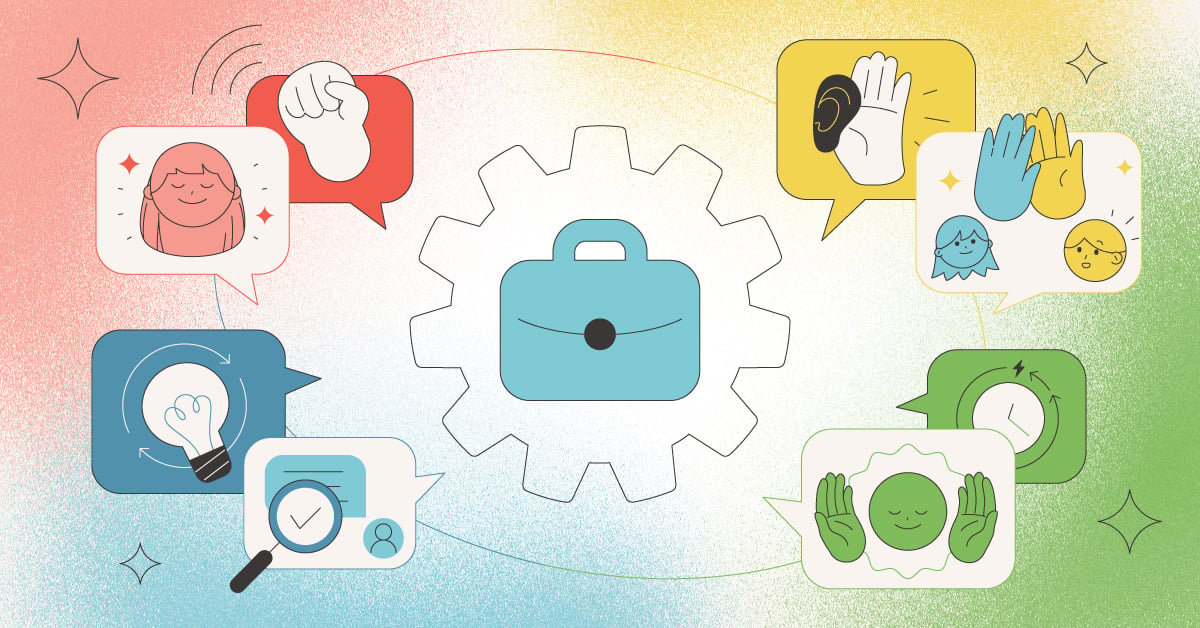
You’ve likely experienced it before: someone who reacts the right way, uses all the right words, and even emotes appropriately, but something is … off. Subconsciously, you might feel uncomfortable or vulnerable.
If you’ve noticed this kind of behavior, you might be picking up on someone faking their emotional intelligence, also known as EQ.
What is Emotional Intelligence (EQ)?
Emotional intelligence is the ability to sense, understand, and effectively apply emotions for higher levels of collaboration and productivity. It has five dimensions: self-awareness, self-regulation, social awareness, social regulation, and motivation. Learn more about EQ here.
What Is Fake Emotional Intelligence?
Fake emotional intelligence is complicated. It’s a mimicked behavior, where someone copies the behavior of a person with high EQ without the necessary skills or awareness to pull it off.
Harvard Business Review shared research that indicates people commonly harness “manipulative misuses of emotional intelligence—the intentionally subtle regulation of one’s emotions to engineer responses from others that might not be in their best interest.”
True emotional intelligence cannot be faked; it will eventually be obvious that the EQ behaviors are not genuine. Faking EQ also isn’t sustainable long-term because of the stress from over-adaptation and potential conflicts along the way.
What Are Signs of Faking EQ?
Inconsistency Between Words and Actions. Saying all the right things, but not following through. For example, presenting as an active listener but not remembering the conversation later, or acting like it never occurred.
Performative Empathy. An exaggerated reaction to others’ hardship or masking of true emotions in favor of displaying more favorable or acceptable emotions.
Lack of Accountability. Being unwilling to own their part in a conflict or a difficult situation, or looking to shift blame away from self.
Emphasis on Personal Image. When someone is more worried about how they are perceived instead of how they have behaved, or apologizes without addressing core problems or behavior.
Overuse of Buzzwords. If someone throws around clinical terms like “narcissist” or “gaslighting” without real knowledge of those terms, or if someone is eager to label others.
Using EQ to Control. Harnessing knowledge of EQ to gain favor or manipulate people, guiding the outcome of situations in their favor.
Why Do People Fake Emotional Intelligence?
While even the concept of faking emotional intelligence can sound loaded and even malicious, it might be happening by accident. Someone with a developed knowledge of EQ could use it to manipulate others, but faking EQ can happen by accident as well.
It could be someone’s earnest attempt to be emotionally involved without adequate structure or awareness to back it up. Some people might be forced to take on a high-EQ persona to survive or advance in the workplace.
“No matter how much work we do or how emotionally attuned we are to others, we’re still going to miss things sometimes,” said Stacey Harris, President of Leadership Resources and Consulting, LLC. “What matters is our effort. If you’re trying to fake emotional intelligence, you’re really missing out on opportunities to engage.”
What’s Your Next Step?
If you recognize these traits in others, the best thing to do is to observe and listen carefully in your interactions. You can’t control the behavior or responses of others, but you can control your response.
Move forward with both caution and optimism, and if the situation arises where you can offer appropriate feedback, try to do so with direct, actionable next steps for the person projecting their EQ.
If you recognize yourself in any traits, that’s OK! Increasing awareness is only a good thing; simply reading this article and noticing similarities has improved your self-awareness.
“As humans, we like to classify emotions as good or bad,” said Harris. “They’re not. They’re neutral—emotions are information, and the thing that I love about EQ is that it’s learned. No matter where you’re at in your career, you can grow. We’re all on a journey.”
Here are three steps to develop genuine EQ:
Take a science-based assessment to get a baseline understanding of your actual EQ. This will give you clear data and a true understanding of your emotional intelligence.
Get objective help from a coach, consultant, mentor, or loved one. Find someone who can help you observe your own habits. This will be best coming from someone who knows you well and understands how to give you feedback.
Focus on mindfulness by paying attention to what’s going on around you. Take note of sensory details, commit to genuine active listening, and reflect on your mood throughout the day to better understand your baseline emotions.
Developing EQ takes time, but it’s an incredibly valuable tool in personal and professional development. If you’re interested in getting your baseline EQ and learning more about opportunities for you, TTI is here to help. Contact us here to get started.



